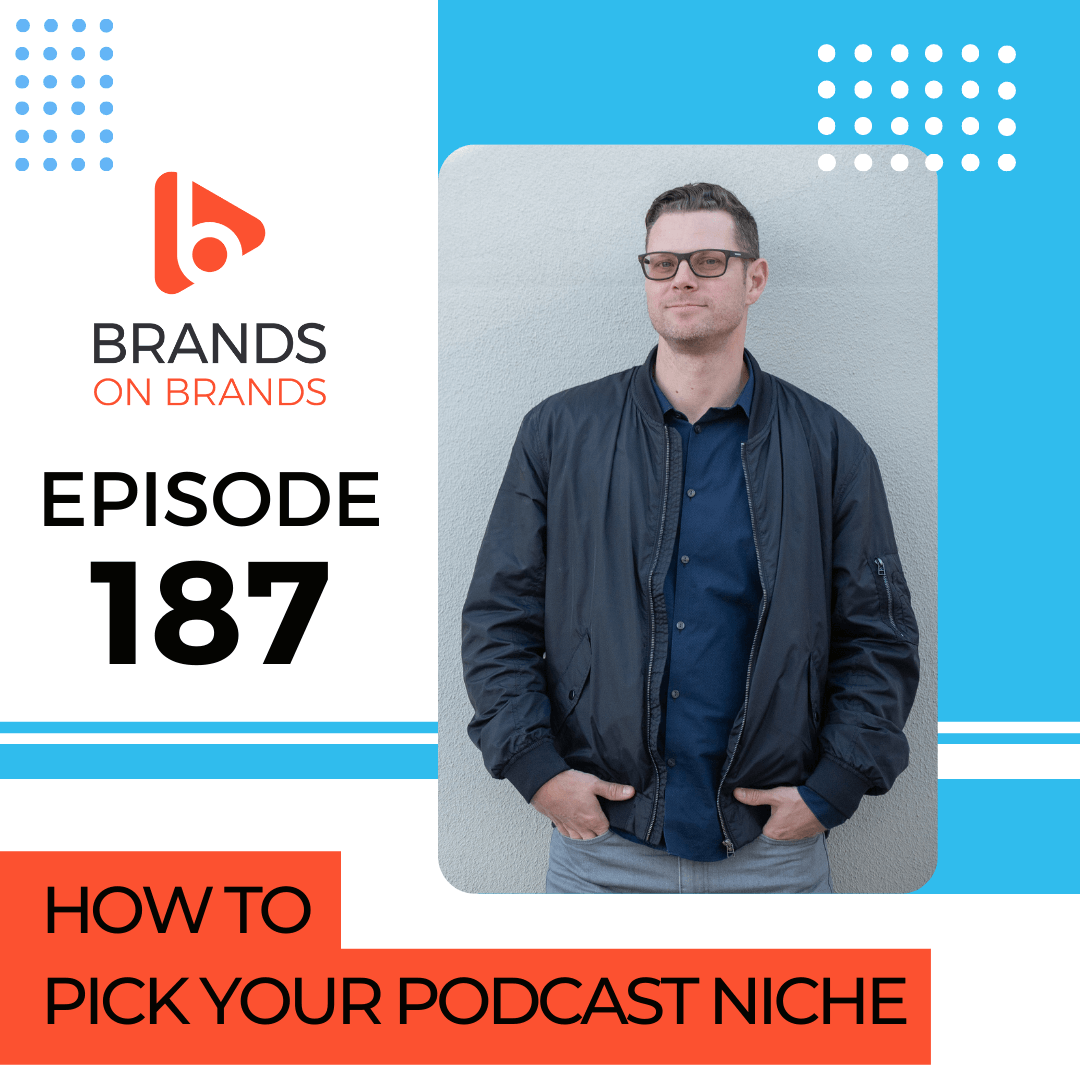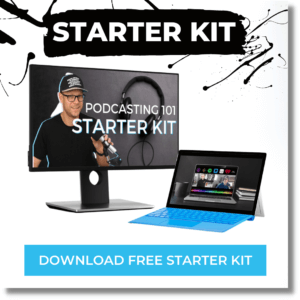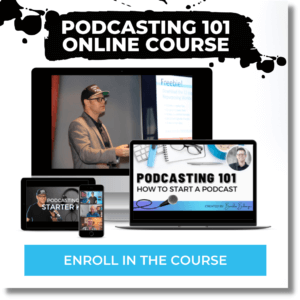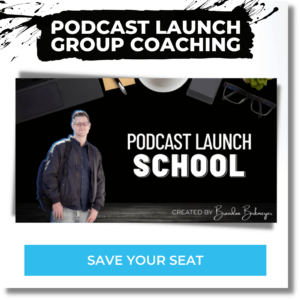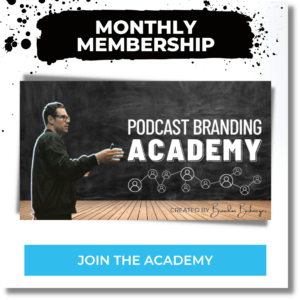Today we’re talking about how to find your podcast niche. Learn how to figure out what your podcast should be about, and how to niche it down in a way that really makes your show stand out.
HOW DO YOU PICK A PODCAST NICHE?
What’s your show going to be about? This is a big question. A lot of people might have an initial idea of what their show could be. Maybe it’s what they’re good at. Should it be about their expertise? Should it be about something they’re passionate about? Should it be purpose-driven?
There are a lot of big questions out there, questions that can help you start to narrow in on what that perfect podcast topic could be for you. I have frameworks, some questions you can ask yourself to help you get there to really feel confident about the topic you pick. That topic is going to really help you identify yourself as you brand yourself in the future.
We’ll start very simple. I like to go high level. If I asked you the question, “What’s your podcast going to be about,” you might already have an answer, but let’s take a step back. I’m going to ask five questions and they’re all “W” questions. It’s the Who, What, Where, When, and How.
Related: Click here to get the FREE Podcasting 101 Starter Kit!
WHO LISTENS TO YOUR PODCAST NICHE?
Let’s go with “Who” first. If you had to picture the person that you know would really benefit from listening to this podcast, who is that person?
Don’t describe a generic audience. In your mind, come up with one real person in your life you know that you would be speaking to and that this show would be for. There are going to be a lot of people like them, and that can be what your audience in your mind is. Whoever it is should be benefiting in some way from that knowledge that they’re getting. Picture that “Who”.
NARROW DOWN YOUR NICHE CATEGORIES
The second question is going to be “What.” What is the show about specifically? What is the content and what are the topics that you want to be covering? Maybe you can list three to five topics that you think are going to become recurring things that you want to talk about over and over again.
I will say if those topics tend to be completely different from each other as you list them out, start to identify which of those topics that you’ve listed out are related to each other in a way that you can bundle one show around. If one or two of the topics in the group seem to be disjointed, not connected or in the same subject matter as the others, I would set those aside for now as a category.

If you want to build a show that actually helps you stand out in your category, it does have to be related all in one subject matter. It cannot be a variety show unless you’re building some entertainment show and you’ve got clout and you are an entertainer. That’s good for you; go for it.
This isn’t that type of show. I’m helping you build an expert podcast that really ties into what your knowledge is and helps you bring that out and help other people. Your topics should be related to one general category.
FIND YOUR PODCAST NICHE BY STARTING MORE BROAD
The next question is “Where”. Where can someone who is looking for your show find it? If they were going into Google and typing in something, what would they type in?
Here is where you start to think more broadly. This is an episode about niching down, but we’re going to start broad. We’re going to start with a macro view. What’s the biggest category that is an umbrella over what your subject matter is?
For a little help on this, what I would do is go into a podcast like the Apple podcast app and look at what the categories are that they break shows into. If you go to the browse section, typically you can see all the subjects. If you look at their charts, you will see what all the subjects are that you can pick from.

Those are topics like business, finance, health, and wellness, et cetera… Which one are you with? Then when you click on those, some of those have subcategories. Within business, marketing is a subcategory. Entrepreneurship is a subcategory. Find for yourself which one of those categories most aligns with where your topics would fall.
KEEP WITHIN THE SAME GENERAL TOPIC
You can pick two or three, but for me, they should all be in the line with the same topic. If it’s marketing, it’d be marketing, business, and maybe entrepreneurship. However, your primary topic is going to be the one that really aligns with your niche. Again, when you look at that niche, it’s still pretty broad.
I wouldn’t even call it a niche, but it is your sub-category or your category. That helps frame what all your content should make sense for. It gives you some guide rails to work within. When you had those subtopics that maybe didn’t fit in, if they didn’t align with this category, they don’t fit in.
If you had a finance blog and one of your topics is fitness or travel, they don’t fit in. That’s a separate show. It is confusing to your audience. It is confusing to the algorithms that show people where you are because when someone’s typing in fitness, they don’t want to find a travel podcast.
Keep that in mind. Pick a category, stick to it. You can pepper in some other topics that you’re interested in when you’re in the content, but that’s not how you brand your show. You can talk about them in the show, but they’re not things that you mention when you’re describing your show to other people.
MAKE SURE TO PODCAST CONSISTENTLY
The next one is going to be “When”. This is just you figuring out how often you are going to release this show. This matters because it’s you committing to what you can regularly do on a consistent basis. Is this a weekly show, or Is this daily? Is it bi-weekly is it monthly? What can you actually commit to? Do you expect to be recording every week or is this something that you want to do for a few weeks and then you want to take a few weeks off?

What I’d recommend is you build something that you can do without stopping. If you’re going to do weekly, I want you to be able to do weekly, fifty-two weeks a year. If you need some help with that, that’s a whole different lesson.
CHOOSE A TIME AND STICK WITH IT
There are ways to do that where you can repurpose old content. You can take maybe a one or two-week hiatus, but I wouldn’t take more than that.
If you’re going monthly, you cannot stop. You cannot do five months and then take five months off. You have to deliver every month. Daily is a little bit of a different story. You can do five days a week and then take two days off, or you can go three days a week. That’s your cadence.
At the end of the day, pick a cadence that you can stick to so that people know every Monday, this is when I expect the content to come out on this show. That will help you set up what you know you have to deliver when you’re building this show later on.
WHAT IS YOUR WHY?
The last is “Why”. One of the most important things you can figure out is why this is an important topic for you. Why did you start the show in the first place? This is what’s going to start to differentiate your show from other shows.
Your approach to teaching the topic, your approach to asking guests questions is all going to be related to why you started this show in the first place. It’s about your unique perspective as to what’s the most important thing people need to know and focus on when trying to succeed in the category that you are living within.
I know the “Why” can be a question that trips a lot of people up. You can start with the things you had a passion for, a topic you wanted to start talking about it. That’s how I started. However, your “Why” really can come to fruition when you start to tap into the things that you believe in.
DRAW A LINE
You may not be able to get there until you record a couple of episodes and start to talk about those topics that you’re really passionate about. Here’s one way to think about it. This is going to be what we call the line in the sand. I didn’t invent this; it is something that I’ve learned from other people, but I’m going to teach it to you guys today.

The line in the sand is you talking about what you believe within your category. Within your topic, what do you believe is the most important thing that people can do to achieve the results that they are looking for?
This is not supposed to be something that is that a question that everyone would say yes to. They call it a line in the sand because you want people that would say yes, they agree with that. You also want people to say, no, they don’t agree with that.
EXAMPLES FROM SPECIFIC NICHES
Here’s an example of a line in the sand. If you are a fitness podcast, your line in the sand could be, “I believe that managing your diet is the only way to consistently succeed at being well and fit.” There are going to be people that disagree with that and say, “Well, no, it’s not just diet. It’s also food.”
The reason you’re going to mention that that’s the most important thing and that’s your belief is because it’s going to draw the people to you that agree and that are ready to take on the mindset of focusing on nutrition. It’s going to send the people away that aren’t really ready to take those steps. This is your line in the sand, who was with me and who was against me.
Another example of this is my show. I said, being a brand and building a brand that matters is the only way for a business to thrive.
What that creates is on one side, it’s, “Well, no, you can just build a business. You don’t need to be known. You don’t have to have a brand.” Some people might disagree. You can disagree, but you’re not for me. You’re the people who are chasing the lowest cost marketing. You are the person who’s trying to build a product and not build the brand or the reputation of that.
For me, you’re going to be priced out of the market. The people that see that and agree with that might listen to the show and say, “Yeah, I’m with Brandon. He aligns with my vision that I need to think long-term about building a brand that doesn’t compete on price. It competes on other qualities.”
DEFINE YOUR PODCAST’S CORE BELIEFS
You have to define for you what it is that you believe in that you think will bring success to your audience, the one main thing.
When you have that core belief, that line in the sand, not only does it help your audience figure out if you are for them or not; it also helps you continue to articulate in all of your content creation from here on out, what it is that you want the show to be about.
What kind of guests do you sign up and bring to the show? What kind of questions will you ask those guests? When you are bringing up topics of conversation and you’re sharing your perspective, it helps you figure out what angle you want to take on presenting those topics.

Nothing is new. No content topic is new anymore, but what is new is the perspective you’re taking when you come at it from that consistent point of view, using your line in the sand. You have a unique perspective that you can share with the world that is yours, that only you have. That’s what helps you start to build the brand that is yours.
CREATE URGENCY IN YOUR PODCAST NICHE
The third thing we want to talk about today to finish this lesson up is a lesson called “Winter is coming.” Again, this is all stuff that is very prominent in the marketing world. I’m sharing it with you as a podcast or a potential podcast or so that you can take advantage of these tried and true tools.
What “Winter is coming” is you create the sense of why it is important that people listen to your lessons right now. What is happening in the world that makes this urgent? Why do they have to know now? Why do they have to take a stance now to start creating change?
The reason it’s called that, for me, is for Game of Thrones. There was this plot tool that they used. Even though every show had its own theme and its own story, there was always this overarching theme across all seasons that winter is coming.
BE PREPARED
What that meant was that no matter what’s happening, we have to prepare for what’s going to happen in three months to six months. We’re not sure when it’s coming, but we know eventually if we’re not prepared, this thing is going to take over and ruin us.
If you’re not familiar with the show, another way to think about it is in your industry, whatever it is, there is something that if people don’t do it eventually, they will not succeed. What is that for you in your industry?
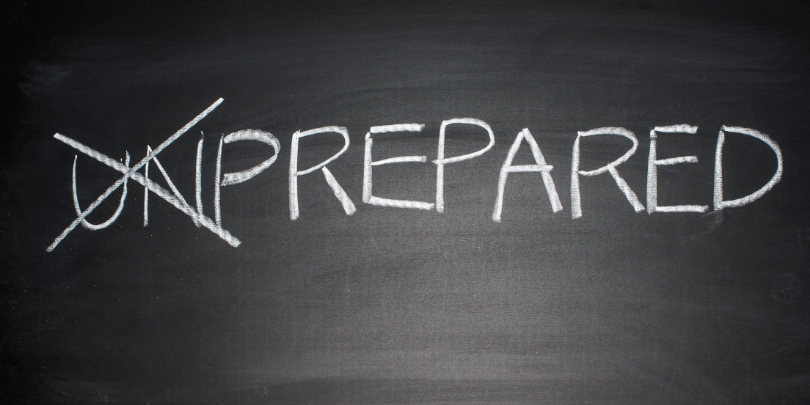
For branding and marketing, I could say that everything, because of technology, is becoming a commodity. Jobs are being replaced. Services are being replaced, products are easy to rebuild because of how easy it is to have access to technology, so you cannot just build a product or service.
You have to build a brand because if not, it’s very easy for someone else to come into the market and replace you. The winter of commodities is coming. Eventually you will be commoditized out of the market. You will be taken over by a larger company that has more money to actually spend to acquire customers, to drive you out of the market because you didn’t build a brand that connects with an audience.
DEFINE WHAT IS IMPORTANT FOR YOUR PODCAST NICHE
That is my version of “Winter is coming”. That is why branding to me is important to every business owner and to every individual person out there. What is that for you? If you’re in the health and fitness space, what is it to you? If we follow that old example of nutrition is what matters, what is your “Winter is coming”?
It’s that eventually, you will get tired of trying and trying and trying to reach your goals, and not taking a stance on nutrition is going to break down your confidence in making this happen. You will eventually give up. That would be the “winter is coming” there as one example.
Figure out that for you, why this is important right now for your audience. You can get personal with it. Think of that one audience member. What is happening in their life that would make this important to them to start to take action on what your podcast is about today?
YOUR PODCAST NICHE WILL SUCCEED
Hopefully that’s helped you guys think about it. Identify what category your show is in. Who is it for? What are the topics you’re going to cover? Just have two to three of them in total. When is it coming out consistently? Why are you starting this? Then you can get into what makes it different, what you believe and why is it important right now?
If you can cover all those things, you’re on your way to having success with this podcast.
CONNECT WITH BRANDON
Instagram: @brandonbirkmeyer
MORE ADVICE AND INTERVIEWS
If you’d like more content about how to build your personal brand, check out my free Content Marketing Starter Guide.
- Don’t want to miss the next thought leader interview? Subscribe to the free B-team Insider Newsletter! And don’t forget to leave a rating and review on iTunes.
Talk soon!
4 Ways To Build Your Podcast Brand
Start Building Your Reputation Today. Take your knowledge out of your head and turn it into an influential podcast brand. Dramatically increase your industry reputation, reach a global audience, gain a passive income and impact people’s lives all over the world. Let me help you create and launch your podcast, grow your audience, and build a highly influential personal brand – the easy way!
Here are 4 ways that I can help you become a known leader in your industry:
